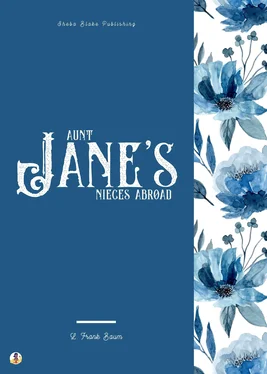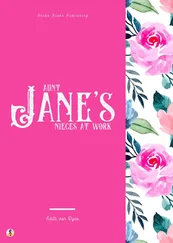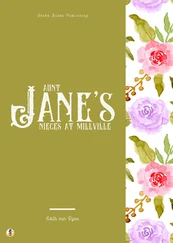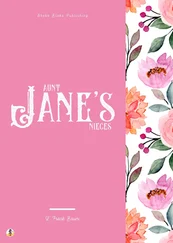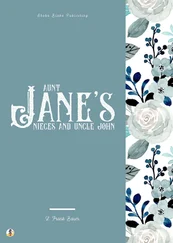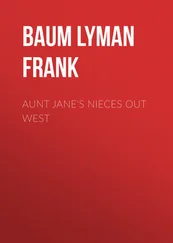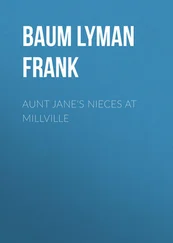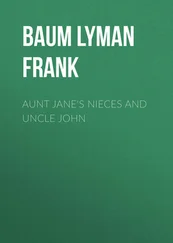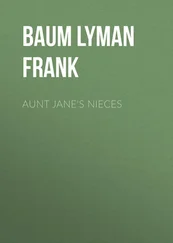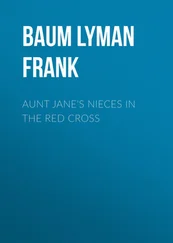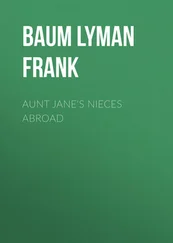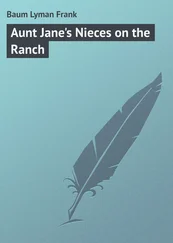L. Frank Baum - Aunt Jane's Nieces Abroad
Здесь есть возможность читать онлайн «L. Frank Baum - Aunt Jane's Nieces Abroad» — ознакомительный отрывок электронной книги совершенно бесплатно, а после прочтения отрывка купить полную версию. В некоторых случаях можно слушать аудио, скачать через торрент в формате fb2 и присутствует краткое содержание. Жанр: unrecognised, на английском языке. Описание произведения, (предисловие) а так же отзывы посетителей доступны на портале библиотеки ЛибКат.
- Название:Aunt Jane's Nieces Abroad
- Автор:
- Жанр:
- Год:неизвестен
- ISBN:нет данных
- Рейтинг книги:4 / 5. Голосов: 1
-
Избранное:Добавить в избранное
- Отзывы:
-
Ваша оценка:
- 80
- 1
- 2
- 3
- 4
- 5
Aunt Jane's Nieces Abroad: краткое содержание, описание и аннотация
Предлагаем к чтению аннотацию, описание, краткое содержание или предисловие (зависит от того, что написал сам автор книги «Aunt Jane's Nieces Abroad»). Если вы не нашли необходимую информацию о книге — напишите в комментариях, мы постараемся отыскать её.
Aunt Jane's Nieces Abroad — читать онлайн ознакомительный отрывок
Ниже представлен текст книги, разбитый по страницам. Система сохранения места последней прочитанной страницы, позволяет с удобством читать онлайн бесплатно книгу «Aunt Jane's Nieces Abroad», без необходимости каждый раз заново искать на чём Вы остановились. Поставьте закладку, и сможете в любой момент перейти на страницу, на которой закончили чтение.
Интервал:
Закладка:
Mr. Merrick was amazed at the contents of the communication, especially as he had so recently parted with the lady who had written it.
It said: “I must warn you, John, that my daughter has just escaped a serious entanglement, and I am therefore more grateful than I can express that you are taking her far from home for a few weeks. A young man named Arthur Weldon—a son of the big railroad president, you know—has been paying Louise marked attentions lately; but I cautioned her not to encourage him because a rumor had reached me that he has quarrelled with his father and been disinherited. My informant also asserted that the young man is wild and headstrong and cannot be controlled by his parent; but he always seemed gentlemanly enough at our house, and my greatest objection to him is that he is not likely to inherit a dollar of his father’s money. Louise and I decided to keep him dangling until we could learn the truth of this matter, for you can easily understand that with her exceptional attractions there is no object in Louise throwing herself away upon a poor man, or one who cannot give her a prominent position in society. Imagine my horror, John, when I discovered last evening that my only child, whom I have so fondly cherished, has ungratefully deceived me. Carried away by the impetuous avowals of this young scapegrace, whom his own father disowns, she has confessed her love for him—love for a pauper!—and only by the most stringent exercise of my authority have I been able to exact from Louise a promise that she will not become formally engaged to Arthur Weldon, or even correspond with him, until she has returned home. By that time I shall have learned more of his history and prospects, when I can better decide whether to allow the affair to go on. Of course I have hopes that in case my fears are proven to have been well founded, I can arouse Louise to a proper spirit and induce her to throw the fellow over. Meantime, I implore you, as my daughter’s temporary guardian, not to allow Louise to speak of or dwell upon this young man, but try to interest her in other gentlemen whom you may meet and lead her to forget, if possible, her miserable entanglement. Consider a loving mother’s feelings, John. Try to help me in this emergency, and I shall be forever deeply grateful.”
“It’s from mother, isn’t it?” asked Louise, when he had finished reading the letter.
“Yes,” he answered gruffly, as he crumpled the missive and stuffed it into his pocket.
“What does she say, Uncle?”
“Nothing but rubbish and nonsense. Eat your soup, my dear; it’s getting cold.”
The girl’s sweet, low laughter sounded very pleasant, and served to calm his irritation. From her demure yet amused expression Uncle John guessed that Louise knew the tenor of her mother’s letter as well as if she had read it over his shoulder, and it comforted him that she could take the matter so lightly. Perhaps the poor child was not so deeply in love as her mother had declared.
He was greatly annoyed at the confidence Mrs. Merrick had seen fit to repose in him, and felt she had no right to burden him with any knowledge of such an absurd condition of affairs just as he was starting for a holiday. Whatever might be the truth of the girl’s “entanglement,”—and he judged that it was not all conveyed in Martha Merrick’s subtle letter—Louise would surely be free and unhampered by either love or maternal diplomacy for some time to come. When she returned home her mother might conduct the affair to suit herself. He would have nothing to do with it in any way.
As soon as luncheon was finished they rushed for the deck, and you may imagine that chubby little Uncle John, with his rosy, smiling face and kindly eyes, surrounded by three eager and attractive girls of from fifteen to seventeen years of age, was a sight to compel the attention of every passenger aboard the ship.
It was found easy to make the acquaintance of the interesting group, and many took advantage of that fact; for Uncle John chatted brightly with every man and Patsy required no excuse of a formal introduction to confide to every woman that John Merrick was taking his three nieces to Europe to “see the sights and have the time of their lives.”
Many of the business men knew well the millionaire’s name, and accorded him great respect because he was so enormously wealthy and successful. But the little man was so genuinely human and unaffected and so openly scorned all toadyism that they soon forgot his greatness in the financial world and accepted him simply as a good fellow and an invariably cheerful comrade.
The weather was somewhat rough for the latter part of March—they had sailed the twenty-seventh—but the “Irene” was so staunch and rode the waves so gracefully that none of the party except Louise was at all affected by the motion. The eldest cousin, however, claimed to be indisposed for the first few days out, and so Beth and Patsy and Uncle John sat in a row in their steamer chairs, with the rugs tucked up to their waists, and kept themselves and everyone around them merry and light hearted.
Next to Patsy reclined a dark complexioned man of about thirty-five, with a long, thin face and intensely black, grave eyes. He was carelessly dressed and wore a flannel shirt, but there was an odd look of mingled refinement and barbarity about him that arrested the girl’s attention. He sat very quietly in his chair, reserved both in speech and in manner; but when she forced him to talk he spoke impetuously and with almost savage emphasis, in a broken dialect that amused her immensely.
“You can’t be American,” she said.
“I am Sicilian,” was the proud answer.
“That’s what I thought; Sicilian or Italian or Spanish; but I’m glad it’s Sicilian, which is the same as Italian. I can’t speak your lingo myself,” she continued, “although I am studying it hard; but you manage the English pretty well, so we shall get along famously together.”
He did not answer for a moment, but searched her unconscious face with his keen eyes. Then he demanded, brusquely:
“Where do you go?”
“Why, to Europe,” she replied, as if surprised.
“Europe? Pah! It is no answer at all,” he responded, angrily. “Europe is big. To what part do you journey?”
Patsy hesitated. The magic word “Europe” had seemed to sum up their destination very effectively, and she had heretofore accepted it as sufficient, for the time being, at least. Uncle John had bought an armful of guide books and Baedeckers, but in the hurry of departure she had never glanced inside them. To go to Europe had been enough to satisfy her so far, but perhaps she should have more definite knowledge concerning their trip. So she turned to Uncle John and said:
“Uncle, dear, to what part of Europe are we going?”
“What part?” he answered. “Why, it tells on the ticket, Patsy. I can’t remember the name just now. It’s where the ship stops, of course.”
“That is Napoli,” said the thin faced man, with a scarcely veiled sneer. “And then?”
“And then?” repeated Patsy, turning to her Uncle.
“Then? Oh, some confounded place or other that I can’t think of. I’m not a time-table, Patsy; but the trip is all arranged, in beautiful style, by a friend of mine who has always wanted to go abroad, and so has the whole programme mapped out in his head.”
“Is it in his head yet?” enquired Patsy, anxiously.
“No, dear; it’s in the left hand pocket of my blue coat, all written down clearly. So what’s the use of bothering? We aren’t there yet. By and bye we’ll get to Eu-rope an’ do it up brown. Whatever happens, and wherever we go, it’s got to be a spree and a jolly good time; so take it easy, Patsy dear, and don’t worry.”
“That’s all right, Uncle,” she rejoined, with a laugh. “I’m not worrying the least mite. But when folks ask us where we’re going, what shall we say?”
Читать дальшеИнтервал:
Закладка:
Похожие книги на «Aunt Jane's Nieces Abroad»
Представляем Вашему вниманию похожие книги на «Aunt Jane's Nieces Abroad» списком для выбора. Мы отобрали схожую по названию и смыслу литературу в надежде предоставить читателям больше вариантов отыскать новые, интересные, ещё непрочитанные произведения.
Обсуждение, отзывы о книге «Aunt Jane's Nieces Abroad» и просто собственные мнения читателей. Оставьте ваши комментарии, напишите, что Вы думаете о произведении, его смысле или главных героях. Укажите что конкретно понравилось, а что нет, и почему Вы так считаете.
